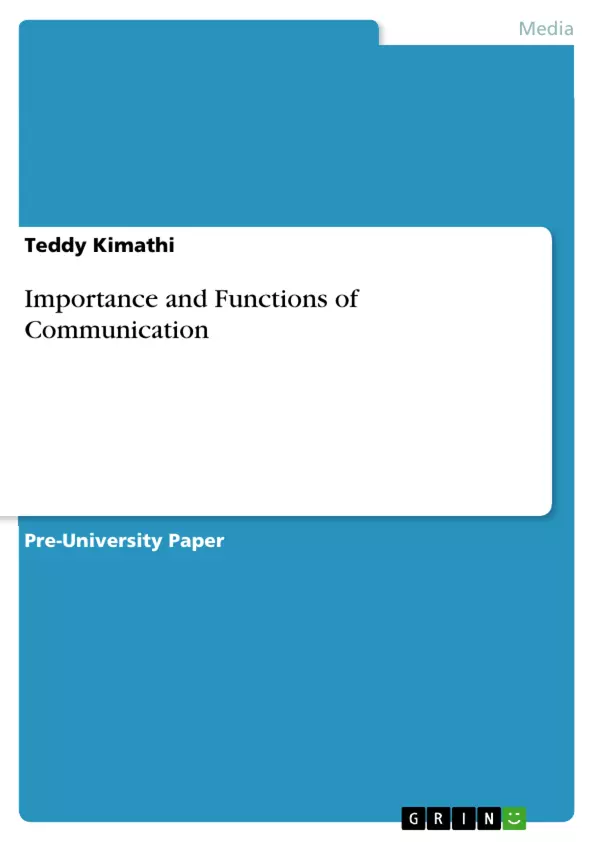Communication is a very important tool, which has helped every one of us to co-exist with each other peacefully and happily. Without it, this world would not have become as it is today, due to several qualities and factors, which it possesses. Communication has been made possible due to some important factors.
This paper shows how communication is vital to us, shaping us in all spheres of life, including family, technology, religion and politics.
Table of Contents
- Importance and Functions of Communication
- Mental, Emotional, and Psychological States
- Business Transactions
- Health Sector
- Transportation
- Access to Information in Underdeveloped Areas
- Guidance and Counseling
- Political Landscape
- Education
- Religion
- Entertainment
Objectives and Key Themes
The main objective of this text is to explore the significance and various functions of communication across different aspects of human life. It aims to demonstrate how communication has impacted social, economic, and technological advancements.
- The impact of communication on mental and emotional well-being.
- The role of communication in facilitating business and economic growth.
- The contribution of communication to advancements in healthcare and scientific understanding.
- The transformative influence of communication on transportation and access to information.
- Communication's role in shaping political systems and cultural development.
Chapter Summaries
Importance and Functions of Communication: This chapter comprehensively explores the vital role communication plays in various facets of life. It begins by highlighting the crucial role communication plays in fostering interpersonal relationships and understanding, citing examples such as therapeutic relationships between psychologists and patients, and the importance of empathy and connection in various professional contexts like teaching and parenting. Furthermore, it details the transformative impact of communication on business, showcasing the advancements brought by technological innovations like computers, telefax, telex, and mobile phones, leading to improved efficiency and security in financial transactions and business operations. The chapter further expands to highlight the significant contributions of communication to the healthcare sector, improved transportation safety and efficiency through technological advancements, and the enhanced access to information and development in previously isolated areas. This broad analysis underscores communication's profound impact on improving overall quality of life and societal progress across various sectors.
Keywords
Communication, interpersonal relationships, business transactions, healthcare, transportation, technology, information access, political landscape, education, religion, entertainment, societal development, global connectivity.
Frequently Asked Questions: A Comprehensive Language Preview
What is the main focus of this text?
This text explores the significance and diverse functions of communication across various aspects of human life. It examines how communication has influenced social, economic, and technological advancements.
What are the key themes covered in this text?
Key themes include the impact of communication on mental and emotional well-being, its role in business and economic growth, its contribution to healthcare and scientific progress, its influence on transportation and information access, and its role in shaping political systems and cultural development.
What are the specific areas where the importance of communication is discussed?
The text analyzes the importance of communication in mental, emotional, and psychological states; business transactions; the health sector; transportation; access to information in underdeveloped areas; guidance and counseling; the political landscape; education; religion; and entertainment.
How does the text discuss the impact of communication on different sectors?
The text details communication's impact on improving interpersonal relationships and understanding, enhancing business efficiency and security through technological advancements (computers, telefax, telex, mobile phones), contributing to advancements in healthcare, improving transportation safety and efficiency, and increasing access to information in previously isolated areas. It highlights the profound impact of communication on overall quality of life and societal progress.
What are the chapter summaries provided?
The provided summary focuses on the "Importance and Functions of Communication" chapter. It comprehensively explores communication's vital role in various life facets, highlighting its impact on interpersonal relationships, business, healthcare, transportation, and access to information, underscoring its profound influence on societal progress.
What keywords are associated with this text?
Keywords include: Communication, interpersonal relationships, business transactions, healthcare, transportation, technology, information access, political landscape, education, religion, entertainment, societal development, global connectivity.
What is the overall objective of this text?
The main objective is to demonstrate the significance and multifaceted functions of communication across diverse human experiences, showcasing its impact on societal advancements.
- Citation du texte
- Teddy Kimathi (Auteur), 2006, Importance and Functions of Communication, Munich, GRIN Verlag, https://www.grin.com/document/279756



